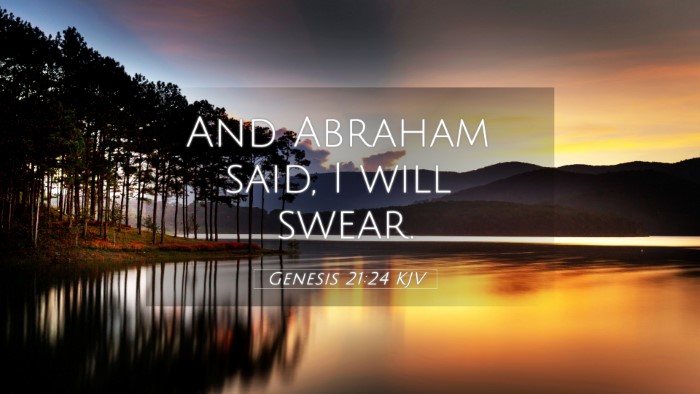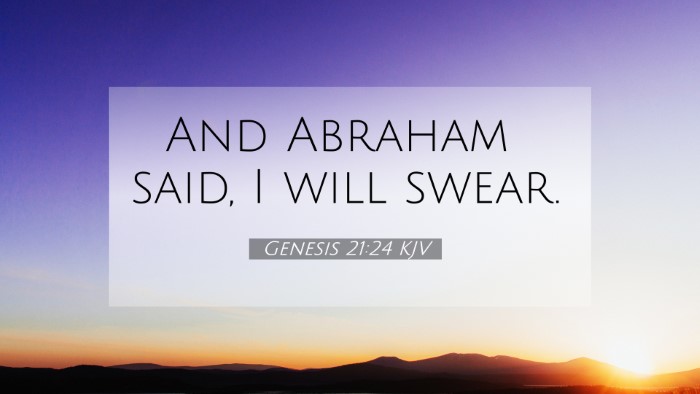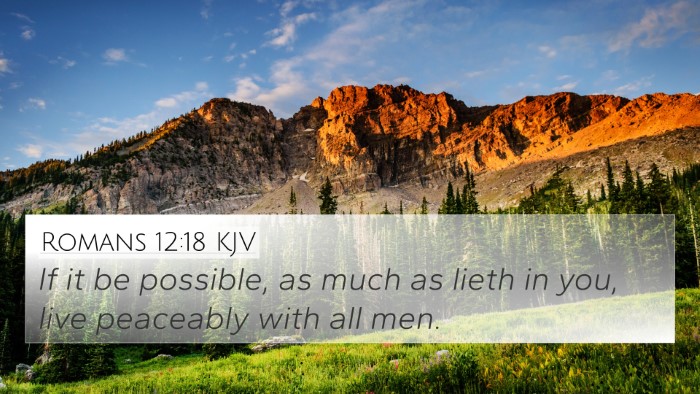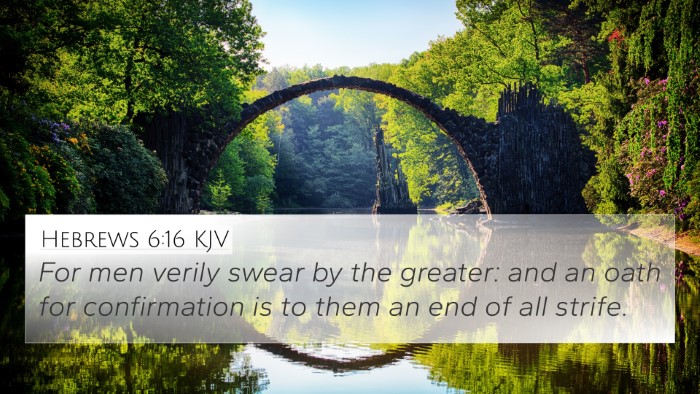Understanding Genesis 21:24
Genesis 21:24 states:
"And Abraham said, 'I will swear.'" (Genesis 21:24, ESV)
This verse is situated within the narrative of Abraham and Abimelech, highlighting a significant moment of covenant-making and trust between the two leaders.
Commentary Insights
The following insights combine thoughts from noted public domain commentaries including Matthew Henry, Albert Barnes, and Adam Clarke.
Matthew Henry's Commentary
Matthew Henry emphasizes the importance of oaths in Old Testament culture, referring to the use of a solemn promise to underscore the integrity and seriousness of Abraham's intentions. He notes that this action further solidifies the bond between Abraham and Abimelech, establishing a peaceful and respectful relationship.
Albert Barnes' Notes
According to Albert Barnes, Abraham's willingness to swear an oath illustrates his commitment to maintaining peace and ensuring fairness in his dealings with Abimelech. Barnes draws attention to the cultural significance of an oath as a means of reinforcing obligations and commitments, allowing for the maintenance of good relations.
Adam Clarke's Commentary
Adam Clarke elaborates on the implications of Abraham's oath, pointing out that it serves as a formal acknowledgment of mutual respect and integrity. He suggests that this moment serves as a pivotal point in how covenants were understood in the ancient Near Eastern context, highlighting that such agreements were taken very seriously.
Thematic Analysis
This verse can be analyzed thematically considering the following aspects:
- Covenant Making: Genesis 21:24 signifies a key moment of establishing a covenant which is a recurring theme throughout the Bible.
- Trust and Integrity: The act of swearing an oath speaks volumes about the importance of integrity and trust in relationships, both in biblical times and today.
- Peaceful Relationships: This verse demonstrates the importance of building and maintaining peace with others, a theme echoed throughout scripture.
- Divine Favor: Abraham's situation reflects God's blessing on his life as he seeks resolution with Abimelech.
Bible Cross-References
This verse connects with a variety of other Scripture passages, illustrating the broader biblical themes and connections:
- Genesis 26:28-29: Similar themes of covenants and oaths can be observed in Isaac’s encounter with Abimelech.
- Exodus 22:11: This passage also references the importance of oaths, expressions of commitment, and the seriousness of vows.
- Deuteronomy 23:21: The regulations regarding vows, echoing the importance placed on oaths within the community.
- 1 Samuel 24:21-22: David’s interactions with Saul reflect the significance of oaths and agreements.
- Psalms 15:4: Discusses the character of those who honor their commitments and keep their promises.
- Hebrews 6:16: Highlights the concept of oaths as a form of confirmation and assurance.
- Matthew 5:33-37: Jesus teaches about oaths, reaffirming the importance of honesty in speech.
- Romans 12:18: Encourages believers to live peaceably with all, reinforcing the relational dynamics seen in Genesis 21:24.
- 2 Corinthians 1:20: Relates to the idea that God’s promises, much like oaths, are infallible.
- James 5:12: Calls for integrity in speech, noting that one should not swear oaths unnecessarily.
Conclusion
Genesis 21:24 invites readers into a deeper understanding of the nature of covenants and the weight of oaths, bringing into focus themes of integrity, trust, and peaceful relations. By cross-referencing this verse with others, one can appreciate the interconnectedness of biblical texts and the overarching themes that tie them together, enriching one's study of Scripture.
Tools for Bible Cross-Referencing
For those seeking deeper insights into Bible verses and their connections, various tools are available:
- Bible Concordance: A useful resource for locating where specific terms and phrases appear within the Scriptures.
- Bible Cross-Reference Guide: Guides that help in identifying related scriptures and thematic connections.
- Cross-Reference Bible Study: Methods to methodically explore the cross-references among verses.
- Bible Reference Resources: Collections of tools aimed at enhancing study and understanding of biblical texts.
- Comprehensive Bible Cross-Reference Materials: Accessible books and online resources that provide expansive insights into scriptural linkages.
Further Study
For those interested in delving deeper, consider the following study questions:
- What do oaths signify in the biblical context?
- How does Abraham's interaction with Abimelech reflect on God’s promise to him?
- What are other significant covenants made in Scripture, and how do they compare to this one?
- How does the act of swearing an oath in Abraham's day differ from modern understandings of promises and commitments?





